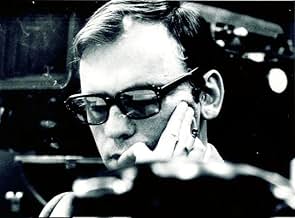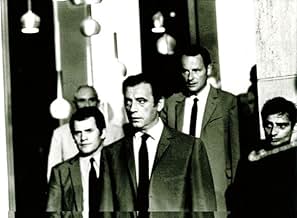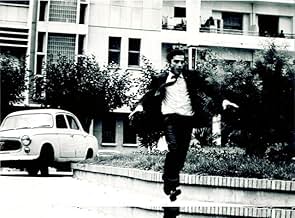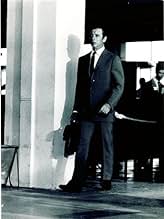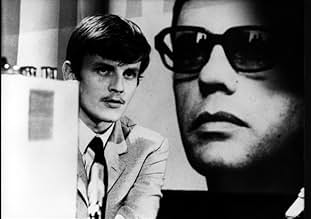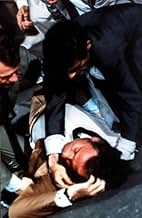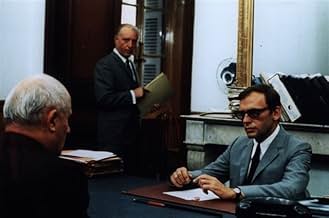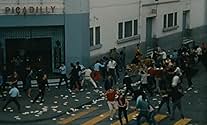A seguito dell'omicidio di un eminente esponente di sinistra, un investigatore cerca di scoprire la verità mentre i funzionari del governo tentano di coprire i loro ruoli.A seguito dell'omicidio di un eminente esponente di sinistra, un investigatore cerca di scoprire la verità mentre i funzionari del governo tentano di coprire i loro ruoli.A seguito dell'omicidio di un eminente esponente di sinistra, un investigatore cerca di scoprire la verità mentre i funzionari del governo tentano di coprire i loro ruoli.
- Regia
- Sceneggiatura
- Star
- Vincitore di 2 Oscar
- 12 vittorie e 13 candidature totali
- Hélène
- (as Irène Papas)
- Vago
- (as Marcel Bozzufi)
- Shoula
- (as Clotilde Joanno)
Recensioni in evidenza
However there are 1-2 things worth mentioning that might interest some folks that are not from Greece: Jean Louis Trintignant's character "The Examining Magistrate" was in reality Christos Sargetakis who became the president of Greece for 5 years(1985-1990).
The film ends with the rise of the military dictatorship and it is suggested that the upposition didn't really capitalise on Lambrakis' assassination.That's not what happened in reality.
In reality the Lambrakis assassination caused the resignation of prime minister Karamanlis(the right wing P.M of Greece at that time) and the triumph of the upposition(something like the democrats in the U.S,the G.Papandreou party,NOT Lambrakis' left wing party) in the elections of 1963 with a whooping 54% which becomes even bigger when taking into account the situation in Greece at that time,with right-wing police controlling everything and manipulating the citizens.
Of course the film was made after the democratic-elected government had fallen and junta had taken over.(in fact the democratic government had fallen 2 years*in 1965* before the junta took over and we had a false semi-democratic government that consisted right wing members of parliament and defected members of the G.Papandreou party)
So in reality the Lambrakis assassination DID make a difference in Greece,if only for 2 years(1963-1965) while on the film nothing changed.I guess with the ultimate rise of the junta that was reigning at the time the film was made it was proper to make the film bleaker than the true events.
While Vassilikos' novel (written in 1966) has driven him to exile from 1967, Theodorakis was still in Greece under surveillance and managed to write his excellent score secretly.
Costa-Gavras gives us a top-class fast paced direction which hasn't aged even today, although I'm sure the Oscar was as much a political decision as a purely artistic one. What is truly spot-on is the casting. Both Montand and Trintignant excel, but even minor roles like Vago and Yago are portrayed in an extremely realistic way. My small objection would be Irene Papas staying near-silent throughout the movie. Although her talent allows her to pull it off with class, I really didn't understand why she was not supposed to talk.
It wasn't what I expected, but turned out to be one of the best political thrillers I've ever seen. You don't really have to know Greek history to see it, in part because the movie never explicitly mentions Greece. Better to do it the other way around, by getting swept up in the gritty often tawdry intrigues you will be learning Greek history without realizing it. Or if you are into conspiracies and cover-ups in general you'll learn how they really aren't the brilliantly crafted master-plans of distant omnipotent figures that most movies show, but are usually the creation of dull mediocrities, full of flaws, stupidities, and ham-fisted improvisations. That they often succeed is more because of brute force than any innate cleverness. This is a powerful and effective movie, which is almost certainly due to its being based closely on reality and the passions that inspired it's making, and from it not being a recycled and denatured Hollywood product. I highly recommend it.
Lo sapevi?
- QuizThe actor playing the doctor got cold feet during his explanation of the X-rays of Z's cranium. A real doctor, acting as an extra, volunteered to fill in and finished the scene - his only acting performance on film.
- BlooperAfter hitting Z, Vigo and Yago escape on a three-wheeler. Shortly thereafter, the driver Yago is captured by a policeman. The policeman searches him and finds a truncheon. When the guard uses the truncheon on Yago's chest to keep him away, the stick clearly flexes.
- Citazioni
Françoise Bonnot, Voiceover Narration: [final lines] The military regime banned: long hair, miniskirts, Sophocles, Tolstoy, Euripides, Russian-style toasts, strikes, Aristophanes, Ionesco, Sartre, Albee, Pinter, freedom of the press, sociology, Beckett, Dostoyevsky, modern music, pop music, new math, and the letter Z, which means HE LIVES in Ancient Greek.
- Curiosità sui creditiAny resemblance to actual events, to persons living or dead, is not the result of chance. It is DELIBERATE. (Signed by) Jorge Semprún, Costa-Gavras
- ConnessioniFeatured in La solitude du chanteur de fond (1974)
- Colonne sonoreMesse Pour le Temps Présent--Psyché Rock
(uncredited)
Composed and Performed by Pierre Henry
Courtesy of Philips/PolyGram Records
by arrangement with PolyGram Special Markets
© 1967 Philips Classics Productions
I più visti
- How long is Z?Powered by Alexa
Dettagli
- Data di uscita
- Paesi di origine
- Siti ufficiali
- Lingue
- Celebre anche come
- Z
- Luoghi delle riprese
- Aziende produttrici
- Vedi altri crediti dell’azienda su IMDbPro
Botteghino
- Lordo Stati Uniti e Canada
- 83.305 USD
- Fine settimana di apertura Stati Uniti e Canada
- 10.144 USD
- 15 mar 2009
- Lordo in tutto il mondo
- 83.305 USD


